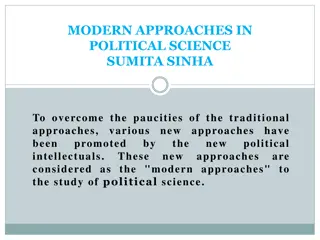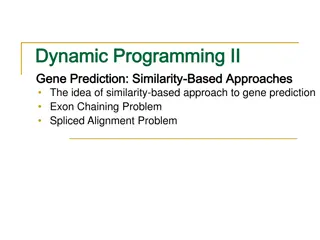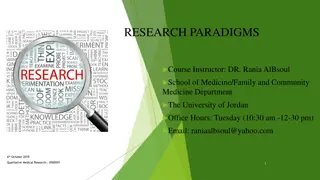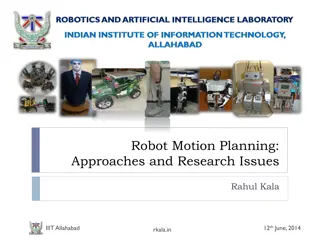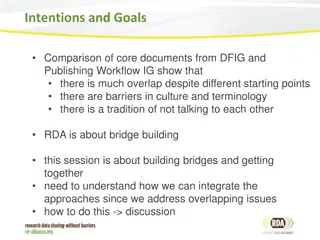Costing Out Approaches
Costing out approaches and studies have been developed to ensure schools and districts have adequate resources to meet state education standards. Implementing these approaches involves professional judgment, evidence-based benchmarks, and data requirements. Using multiple approaches allows for trian
0 views • 12 slides
Understanding Neural Networks: Models and Approaches in AI
Neural networks play a crucial role in AI with rule-based and machine learning approaches. Rule-based learning involves feeding data and rules to the model for predictions, while machine learning allows the machine to design algorithms based on input data and answers. Common AI models include Regres
9 views • 17 slides
Approaches to Competency-Based Approaches: Support Devices at the UHA Scale
Deployment of Competency-Based Approaches at UHA entails personalized support mechanisms for undergraduate, professional, and master's students. The process involves multiple levels of actors, structured timelines, and a framework for initiating and implementing the approach. Various strategies are
1 views • 28 slides
Overview of Research Process and Quantitative Research Phases
The research process involves steps like identifying, locating, assessing, and analyzing the research question to find answers. It includes quantitative and qualitative approaches, with specific phases like conceptual, design, empirical, analytic, and disseminating phases in quantitative research. E
9 views • 27 slides
UCC Research Support and Strategies Overview
UCC's Research Support, Policy & Strategy function, led by David O'Connell, PhD, provides comprehensive support for research activities at the university. The office manages research funding, monitors performance, and facilitates engagement with external stakeholders. UCC's involvement in Horizon Eu
3 views • 17 slides
Understanding Quantitative and Qualitative Research Methods
Exploring the differences between quantitative and qualitative research methods, this content delves into the importance of qualitative research, various methodologies such as focus groups and interviews, data collection, research ethics, and analysis techniques. It also covers the elements of the r
4 views • 43 slides
Understanding Social Science Research for Non-Social Scientists at University of Bath
This resource delves into social science research fundamentals, encompassing types of inquiry, empirical research categories, primary and secondary research distinctions, and the importance of selecting a suitable research topic. It offers guidance on initiating research based on empirical observati
1 views • 10 slides
Modern Approaches in Political Science: Overview and Characteristics
Explore modern approaches in political science pioneered by intellectuals to address the limitations of traditional methods. These approaches emphasize empirical data, interdisciplinary study, and scientific methods to draw conclusions beyond political structures and historical analysis. Key modern
1 views • 13 slides
Gene Prediction: Similarity-Based Approaches in Bioinformatics
Gene prediction in bioinformatics involves predicting gene locations in a genome using different approaches like statistical methods and similarity-based approaches. The similarity-based approach uses known genes as a template to predict unknown genes in newly sequenced DNA fragments. This method in
1 views • 40 slides
Effective Proposal Writing for Health Research
Learn about the fundamentals of research proposals for health-related studies, including defining research, understanding the purposes of health research, and exploring motivation for undertaking research. Discover the difference between basic and applied research, examine types of research, and del
1 views • 70 slides
Enhancing Recruitment and Retention Strategies in Research Settings
This content delves into the challenges and approaches in recruitment and retention processes for research studies. It covers topics such as review of recruitment tools, engagement in discussions on effective practices, utilization of mass mailings and social media for participant recruitment, and m
2 views • 19 slides
Understanding Models of Postgraduate Supervision and Different Supervisory Approaches
Explore the various roles, styles, and models of postgraduate supervision, delving into the distinctions between supervisor tasks, interaction approaches, and supervision structures. Learn how different supervision models like one-on-one, panel, project, and doctoral programme supervision impact res
1 views • 13 slides
Overview of Research Problem Identification and Formulation
Understanding the importance of defining a research problem, this content delves into the selection and formulation of research problems, the definition of a research problem, reasons for defining it, methods for identifying research problems, sources of research problems, and considerations in sele
1 views • 11 slides
Understanding the Essence of Research: A Comprehensive Overview
Research is a systematic pursuit of new knowledge, aiming to unveil hidden truths through data collection and analysis. This course outline delves into the fundamentals of research, covering topics such as types of research studies, importance of research, and distinctions between pure and applied r
2 views • 32 slides
Understanding Research Methods and Participants
Explore the differences between method and methodology, types of research methods and methodologies, characteristics of participants in studies, and inclusion/exclusion criteria. The content elaborates on the importance of rationale, justification, and techniques/tools used in research, along with e
0 views • 17 slides
Epic Tools for Clinical Research by Shara Power, RN, BSN, OCN
Explore Epic tools for clinical research developed by Shara Power, a skilled application developer specializing in EPIC Beacon Oncology at UIHC Healthcare Information Systems. Learn about managing research study records, investigational study medication orders, and the process for creating and using
0 views • 26 slides
Understanding Quantitative Research Design in Social Science
This content covers various aspects of quantitative research design, including descriptive and correlational studies, research design blueprint, robust research design considerations, and different types of research approaches. It emphasizes the characteristics, techniques, and terminologies associa
0 views • 24 slides
Approaches to Study Comparative Politics: Traditional vs. Modern Perspectives
This chapter discusses the importance of approaches in the study of comparative politics, categorizing them into traditional and modern perspectives. Traditional approaches include philosophical, historical, and traditional institutional approaches, highlighting their strengths and limitations. Mode
0 views • 7 slides
Understanding Research Paradigms in Qualitative Medical Research
Delve into the world of research paradigms in qualitative medical research with a focus on the key differences between objective and subjective research, the meaning of research paradigms, components of research paradigms, types of research paradigms, and how paradigms guide the selection of researc
0 views • 42 slides
Qualitative vs. Quantitative Approaches in Health Research
Exploring the different methodologies, paradigms, and methods used in health research, this content highlights the distinction between qualitative and quantitative designs. It covers research questions, aims, objectives, hypotheses, and various quantitative approaches such as experimental and observ
1 views • 28 slides
Understanding Research Methods: Quantitative, Qualitative, and Mixed Approaches
This introduction provides an overview of qualitative, quantitative, and mixed methods research, highlighting key differences and various types of research approaches. It delves into exploratory, descriptive, and causal research methodologies, offering insights into problem discovery, data collectio
0 views • 50 slides
Guidelines for Selecting Research Project Topics in Environmental Health
Research is crucial for addressing environmental health issues. Choosing a good research topic is the first step towards effective research. This paper discusses the meaning, characteristics, types of research, and the research process to help in selecting appropriate research topics. Understanding
0 views • 15 slides
Comprehensive Research Training Programme in Social Sciences
Delve into the Research Training Programme offered by the Graduate School of Social Sciences, led by Professor Mark Tranmer. Explore the importance of research methods training, course offerings under the Research Training Programme (RTP), the Certificate in Social Science Research Methods (CSSRM),
5 views • 11 slides
Understanding Word Sense Disambiguation: Challenges and Approaches
Word Sense Disambiguation (WSD) is a complex task in artificial intelligence that aims to determine the correct sense of a word in context. It involves classifying a word into predefined classes based on its meaning in a specific context. WSD requires not only linguistic knowledge but also knowledge
2 views • 12 slides
Comparison of GUI-Based and Text-Based Assignments in CS1
This study investigates the effectiveness of GUI-based assignments compared to text-based assignments in a CS1 course. The research explores how student motivation impacts their performance and retention in the course. It also delves into student preferences between GUI-based and text-based assignme
0 views • 19 slides
Robotic Motion Planning: Approaches and Research Issues
This content delves into various aspects of robot motion planning, covering topics such as problem-solving in mobile robotics, strategic planning, obstacle avoidance, control, base algorithms like graph search, pros and cons of different approaches, research issues, and objectives related to travel.
0 views • 26 slides
Understanding Research Design in Botany: An Overview
Explore the fundamentals of research design in botany through topics like introduction, parts, features, and importance. Learn about the meaning of research, problem formulation, data collection, and different types of research approaches such as descriptive, applied, quantitative, and qualitative.
0 views • 19 slides
Strengthening Value of Spiritual Care Services Through Recent Research
Recent research emphasizes the importance of spiritual care services, highlighting collaborative efforts, evidence-based approaches, and strategic partnerships in the field. Initiatives focus on research efficacy, quality of care, and outcomes measurement, aiming to enhance patient experience and cl
0 views • 42 slides
Improving Education Through Online Serious Game Creator Research Report
Enhance pedagogic research in higher education using an Online Serious Game Creator. The project involves research meetings, conferences, and questionnaire-based studies to improve learning methods. It focuses on creating serious games based on research reports and integrating them into educational
0 views • 37 slides
Approaches to Planning in Leisure, Sport, and Tourism: A Detailed Analysis
This content discusses various approaches to planning for leisure, sport, and tourism, emphasizing stakeholder requirements, fixed standards, unmet needs, benefits provision, and increasing participation. It explores the types of approaches such as adopting fixed standards, providing opportunities,
0 views • 28 slides
Understanding Research Methods and Approaches in Behavior Studies
Explore various research methods and approaches to studying behavior, including biological, cognitive, and socio-cultural perspectives. Learn about legitimate research methods, assessment criteria, and specific examples such as bio methods focusing on brain, hormones, genes, and behavior. Dive into
0 views • 28 slides
Building Bridges and Integrating Approaches in Research for Efficiency and Interoperability
Despite different starting points, there is significant overlap in the core documents of DFIG and Publishing Workflow IG. The session focuses on integrating approaches to address overlapping issues, with an emphasis on building bridges between diverse research cultures and terminology barriers. Key
0 views • 16 slides
Automatic Extraction Model of Thesis Research Conclusion Sentences
Full-text academic literature contains rich data that can be analyzed using machine learning techniques. This research focuses on extracting thesis research conclusion sentences automatically to enhance summarization processes. The study involves data processing, annotation, and creating discriminan
0 views • 9 slides
Approaches to Variance Estimation in Social Policy Research
This lecture discusses approaches to estimating sampling variance and confidence intervals in social policy research, covering topics such as total survey error, determinants of sampling variance, analytical approaches, replication-based approaches, and the ultimate cluster method. Various methods a
0 views • 34 slides
Surgical Approaches to Foramen Magnum Lesions: Anatomy and Considerations
Surgical approaches to foramen magnum lesions involve understanding the anatomical structures, diameters, condyles, and contents of the region. Critical considerations include the choice of surgical approach based on the location and extent of the lesion, size, and nature of the pathology. Approache
0 views • 53 slides
Role of Research Nurses in Advancing Evidence-Based Practice in Nursing
Research nurses play a crucial role in advancing evidence-based practice in nursing by conducting systematic inquiries to validate existing knowledge, develop new skills, and solve nursing problems. This overview discusses the importance of research in nursing, the significance of evidence-based pra
0 views • 21 slides
Emerging Design and Analysis Approaches in COVID-19 Research
Dennis Ross-Degnan from Harvard Medical School discusses the NEXT-D lessons for COVID-19 research, focusing on study design, bias reduction, data metrics, and the value of long-term research consortia like NEXT-D. The content covers interventions, comparators, observational study design issues, and
0 views • 11 slides
Understanding Public and Patient Involvement (PPI) in Research
Public and Patient Involvement (PPI) in research emphasizes active participation of the public and patients in various research activities such as defining research questions, steering research projects, and engaging with research outcomes. It differentiates involvement, participation, and engagemen
0 views • 15 slides
Exploring Research Design and Funding Priorities in Northern Ireland
Dive into the world of research at the upcoming Application and Research Design Workshop scheduled for Friday, 28th May 2021. Discover the strategic priorities driving impactful research initiatives, learn about current research projects, funding processes, and collaborations. Explore the rich histo
0 views • 37 slides
Dynamical Approaches to Quarkonia Suppression
This research explores dynamical approaches to understand quarkonia suppression, particularly in the context of Quantum Chromodynamics. By examining quantum thermalisation, stochastic semi-classical methods, and Schrdinger-Langevin approaches, the aim is to go beyond traditional models and offer a m
0 views • 28 slides







